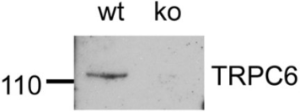Overview
- Peptide (C)RRNESQDYLLMDELG, corresponding to amino acid residues 24-38 of mouse TRPC6 (Accession Q61143). Intracellular, N-terminus.
- Rat brain lysates (1:200-1:400). Addition of 0.1-0.5% Tween-20 to the antibody solution is recommended. Rat distal pulmonary smooth muscle cell lysate (PASMCs), (see Zhang, Y. et al. (2013) in Product Citations).
 Western blot analysis of rat brain membranes:1. Anti-TRPC6 Antibody (#ACC-017), (1:200).
Western blot analysis of rat brain membranes:1. Anti-TRPC6 Antibody (#ACC-017), (1:200).
2. Anti-TRPC6 Antibody, preincubated with TRPC6 Blocking Peptide (#BLP-CC017).
- Human platelets (Hassock, S.R. et al. (2002) Blood 100, 2801.).
- Mouse brain sections.
- Human U373 MG cells (1:120) (Barajas, M. et al. (2008) J. Neurosci. Res. 86, 3456.).
- Human pulmonary artery smooth muscle cells (PASMCs) (Yu, Y. et al. (2004) Proc. Natl. Acad. Sci. U.S.A. 101, 13861.).
- The blocking peptide is not suitable for this application.
The Transient Receptor Potential (TRP) superfamily is one of the largest ion channel families and consists of diverse groups of proteins. In mammals, about 28 genes encode the TRP ion channel subunits. The mammalian TRP superfamily comprises six subfamilies known as the TRPC (canonical), TRPV (vanilloid), TRPM (melastatin), TRPML (mucolipins), TRPP (polycystin) and the TRPA (ANKTM1) ion channels.1-4
The TRPC subfamily consists of seven proteins named TRPC1 to 7 which can be further divided into four subgroups based on their sequence homology and functional similarities:
1. TRPC1.
2. TRPC4 and TRPC5.
3. TRPC3, TRPC6, TRPC7.
4. TRPC2.2,5
They are highly expressed in the central nervous system and to a lesser extent in peripheral tissues.
TRPC6 can form heterotetramers with TRPC3 and TRPC7. It is primarily expressed in brain, lung and muscle. High levels of expression of the channel were also found in human platelets. Recently it was reported that TRPC6 is also expressed in the kidney where a mutated channel has been implicated in kidney failure disease.6,7
Application key:
Species reactivity key:

Knockout validation of Anti-TRPC6 Antibody in mouse glomerular lysates.Western blot analysis of mouse glomerular lysates using Anti-TRPC6 Antibody (#ACC-017) in wild type and TRPC6-/- mice. TRPC6 is not detected in knockout mice.Adapted from Kistler, A.D. et al. (2013) J. Biol. Chem. 288, 36598. with permission of the American Society for Biochemistry and Molecular Biology.
